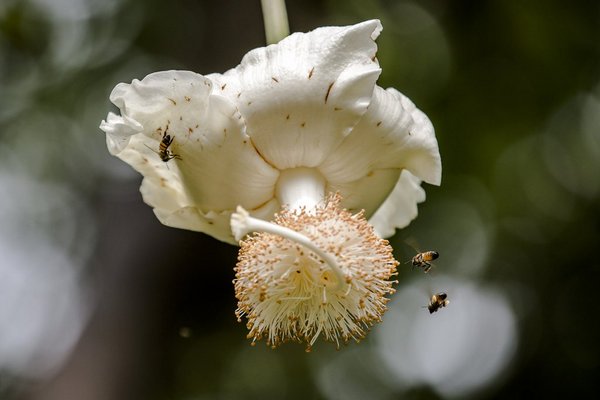- Share this article
- Subscribe to our newsletter
Time is not on our side
COVID-19 has highlighted the significance of zoonoses, diseases of animal origin to which Ebola and HIV also belong. In late October 2020, more than 250 experts got together at the Global Landscapes Forum Digital Biodiversity Conference “One World, One Health” to discuss integrating biodiversity and landscape perspec-tives into efforts to prevent future outbreaks of zoonoses. The event was joined by 5,000 people from 120 countries, comprised 50 scientific sessions and launched 15 policy-informing papers in the run-up to major 2021 events such as the UN Biodiversity Talks in Kunming, China, which should have been held this year but were postponed because of the pandemic.
“This pandemic is just one in a whole string that has been happening faster and faster on our planet be-cause of unsustainable land use, wildlife trade and consumption,” said Peter Daszak, President of US-based organisation EcoHealth Alliance and promoter of the One Health approach, which calls for addressing hu-man, animal and ecological health in tandem to prevent disease outbreaks. “We need to work together: the virologists, conservationists, people working on environmental change – we all have a role to play,” Daszak emphasised.
Degraded landscapes were costing up to ten per cent of the global gross domestic product in terms of lost ecosystem services, explained Sir Robert Watson, head of the scientific advisory group for the UNEP Global Assessments Synthesis Report. “We need to act now,” Watson stressed. “The situation is urgent, and time is not on our side.”
Reaching a tipping point
“We are seeing more environmental degradation than ever before,” warned Elisabeth Mrema, Executive Secretary at the UN Convention on Biological Diversity. “Climate change is leading to health crises in several countries – we are reaching a tipping point.” In this context, Mrema also noted the important role of biodiver-sity as a source of medicine. Unsustainable human action was to blame for COVID-19, not nature itself, which ought rather to be seen as part of the solution to the crisis – restoring nature meant less zoonotic disease. Strengthening resilience was key, and required focusing the action of youth, women, farmers, the private sector and others in society on the link between human health and healthy nature.
In 2006, Laura H. Kahn published “Confronting Zoonoses, Linking Human and Veterinary Medicine” in the Journal of Emerging Infectious Diseases, issued by the USA’s Centers for Disease Control and Prevention (CDCs). Her paper helped launch the One Health Initiative, which seeks to forge collaboration between phy-sicians, veterinarians, dentists, nurses and other health science and environment related disciplines, linking not only a wide range of US institutions including the Department of Agriculture and the National Environ-mental Health Association, but also being endorsed by nearly a thousand prominent scientists, physicians and veterinarians across the world.
At the Conference, Kahn stressed the importance of examining the root causes of spill-over events. “Zoono-tic events are spreading through society’s demand for meat,” she maintained, and, referring to the UN’s proclamation of food as a human right, she pointed out that it did not say what kind of food was meant. Kahn questioned whether the consumption of wild animals was a human right, and considered whether the wildlife trade ought to be banned to stop spill-over effects.
Comparing the USA, India and China, Kahn pointed out the important role of wild animals in the latter’s meat consumption and in Traditional Chinese Medicine. India, in contrast, had the world-wide largest fraction of vegetarians among its population. The highest level of meat consumption globally was in the USA. Kahn suggested that the role of meat be further assessed in the context of zoonoses. “We must figure out how to sustainably feed ourselves on a hotter, drier planet,” she concluded, stressing the significance of an interdis-ciplinary, holistic One Health approach.
Landscape Heroes award
The Conference also focused on Indigenous Peoples and youth. The GLF 2020 Landscape Heroes award was won by the network of indigenous communities living in and around the Prey Lang forest in Cambodia. The award was recently introduced to celebrate people taking action, often at considerable personal risk, to safeguard the planet’s biodiversity. The network was selected by a panel of experts among 80 submissions from around the world. Six young restoration experts representing six ecosystems through the Restoration Stewards programme were announced who will receive mentorship and funding from six partner organisa-tions, including CIFOR-ICRAF, the Center for International Forestry Research/World Agroforestry merger.
Mike Gardner, journalist, Bonn, Germany





Add a comment
Be the First to Comment